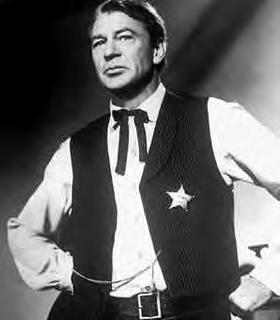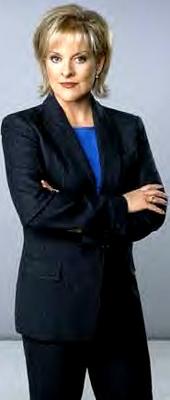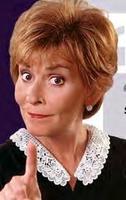 My obsession with Judge Judy annoys my sister to no end. She thinks Judy is rude, loud and totally inappropriate, and that her oh so colorful antics—like clapping her hands to shut people up, or shouting them down to ask if they’re on medication—would never fly in a real courtroom. It is a real courtroom, I insist. The cases are real, the rulings are real, the judgments are final—the guy says so right in the opening titles. Being a Big Deal Lawyer, my sister always has to have the last word. “Not really,” she tells me. “That’s why they call it television.”
My obsession with Judge Judy annoys my sister to no end. She thinks Judy is rude, loud and totally inappropriate, and that her oh so colorful antics—like clapping her hands to shut people up, or shouting them down to ask if they’re on medication—would never fly in a real courtroom. It is a real courtroom, I insist. The cases are real, the rulings are real, the judgments are final—the guy says so right in the opening titles. Being a Big Deal Lawyer, my sister always has to have the last word. “Not really,” she tells me. “That’s why they call it television.”Reality television, I want to remind her but don’t, since that would be me having the last word and all. The fact is, however, that my sister has an actual job to get up and go to and thus hasn’t spent my kind of quality time in Judge Judy’s courtroom. Nor has she devoted my brand of personal energy to analyzing this particular show in relation to the other judge and lawyer shows, like my second favorite, Nancy Grace. My sister also hates the feisty former prosecutor, and is equally miffed by my devotion to her. Not only does she have big hair and crazy eyes, I'm told, but she also was chased away from the Atlanta D.A.’s office and right onto national television due to some horrible act of prosecutor misconduct.
 Well, I say right on to that. Nancy is only five feet tall, weighing in at ninety pounds, according to an interview I saw between her and Jimminy Glick on Larry King—once again demonstrating the boundless time I have on my hands. I first discovered little Nancy right after the O.J. Simpson trial, when she was Johnny Cochran’s partner on a Court TV show called Cochran and Grace. She’d never once let that big blowhard, God rest his soul, have the last word—reason enough to tune in right there. During the Michael Jackson trial, she’d open her show paging through The Boy, the erotic coffee table book filled with all kinds of little boy nudie shots that prosecutors nabbed from Michael’s Neverland bedroom—and recently had to return to him.
Well, I say right on to that. Nancy is only five feet tall, weighing in at ninety pounds, according to an interview I saw between her and Jimminy Glick on Larry King—once again demonstrating the boundless time I have on my hands. I first discovered little Nancy right after the O.J. Simpson trial, when she was Johnny Cochran’s partner on a Court TV show called Cochran and Grace. She’d never once let that big blowhard, God rest his soul, have the last word—reason enough to tune in right there. During the Michael Jackson trial, she’d open her show paging through The Boy, the erotic coffee table book filled with all kinds of little boy nudie shots that prosecutors nabbed from Michael’s Neverland bedroom—and recently had to return to him. Nancy was outraged. Judge Judy doesn’t comment on this sort of thing, but I’m convinced she was, too. My personal theory is the reason they pay Judy the big bucks—twenty million a year, from what I read—is because we’re all looking for a big bully with absolute power to take our side unequivocally. We want the bad guy punished, fined and publicly humiliated by someone with the stones to make him bend over and take it like a man.
Judy is also tiny, and she wears pearl earrings and a sweet little lace collar peaking above her robes. When Some Brutish Litigant gets even the least bit out of control, she waves over her bailiff, Byrd—who’ll just kind of stand next to the weasel and demonstrate his superior girth. Once in awhile he’ll whisper something inaudible in the offender’s ear, I’m guessing some Mr. T. catch phrase like, “I pity the fool.”
 Most of the time, though, Byrd just stands by chuckling to himself about what a tub of butter he fell into when Judy whisked him away from the daily grind of the New York City family court system and off to Hollywood. I like to picture the two of them driving out here together in some old jalopy, like Grannie and Jethro in The Beverly Hillbillies. I bet they live in side-by-side mini-mansions and bank with Miss Jane and Mr. Drysdale.
Most of the time, though, Byrd just stands by chuckling to himself about what a tub of butter he fell into when Judy whisked him away from the daily grind of the New York City family court system and off to Hollywood. I like to picture the two of them driving out here together in some old jalopy, like Grannie and Jethro in The Beverly Hillbillies. I bet they live in side-by-side mini-mansions and bank with Miss Jane and Mr. Drysdale. Judge Judy has all kinds of catch phrases of her own, like my personal favorite, “Don’t pee on my leg and tell me it’s raining.” I myself would like to say this to Some Studio Suit next time one tells me how charming he found my Heartwarming Funeral Comedy that he has no intention of making. Judy wrote a book called Beauty Fades, But Dumb Is Forever, a piece of advice she gives the countless women who’ve lent their addict boyfriends bail money, only to be dumped for a pregnant second cousin hidden in the wings. Sometimes there’s a third and more recent girlfriend, who shows up to support his version of events. Judy will look at the guy, then at the women, then back the guy and say, “I just don’t see it.”
Maybe the reason I’m so fascinated with television justice is because of how systematically unfair Hollywood is, how very partial and subjective. My film school professor who was also formerly a Famous Scary Superagent used to say he could look in your eyes and tell you if you were going to make it or not. It was a big lecture hall, and I only got close to him once, when I hugged him goodbye at the end of the term. He looked into my eyes, and I knew he saw my destiny but wasn’t going to reveal it—not even if I begged him to.
 Judge Judy would have cut to that particular chase in a heartbeat. “Pack your bags and catch the first bus out,” she’d bark. Or, in the alternative, “You’re a born star, now quit your whining and get back to work.” She doesn’t own the liar chip all your other Big Hollywood Types have installed in their brains somewhere along their way to the top. The one compelling them to tell you one thing and tell the rest of the town the other, where they yes you to death when what they really mean is not only no, but hell no—and don’t let the door hit you in the ass on your way out.
Judge Judy would have cut to that particular chase in a heartbeat. “Pack your bags and catch the first bus out,” she’d bark. Or, in the alternative, “You’re a born star, now quit your whining and get back to work.” She doesn’t own the liar chip all your other Big Hollywood Types have installed in their brains somewhere along their way to the top. The one compelling them to tell you one thing and tell the rest of the town the other, where they yes you to death when what they really mean is not only no, but hell no—and don’t let the door hit you in the ass on your way out. I recently had a job interview to do morning crafts services behind the scenes on Judge Judy, though I was the one asking most of the questions. "How does Judy take her coffee?" I inquired, completely riveted. She likes fruit tea, and low-fat cream cheese with her daily bagel. "How much physical time would I get to spend with her?" I demanded to know. "What kind of car does she drive?" "Does the husband judge ever show up to visit?" Needless to say, I didn't get the job, since they likely suspected I was some kind of crazed stalker of celebrity legal figures, and they were probably right.
I guess one more thing they don’t tell you in film school, and in all fairness, they really shouldn’t have to, is there is no justice in Hollywood, except in the movies themselves. If that’s what you came here looking for, you best hightail it home to Umatilla, where everything makes sense—virtue is rewarded, evil is punished and mediocrity politely ignored. For now, I’ll have to get that in my TV courtrooms, where the people are real, the cases are real and the rulings are final. Yup, I guess I do get the last word every once in awhile. How's that for Hollywood justice?